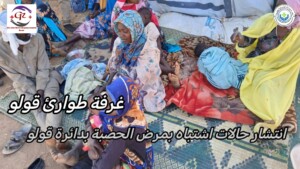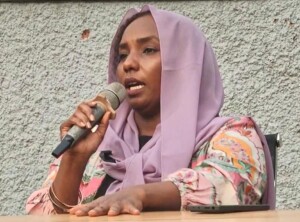Sudan’s health crisis far from over as other diseases spread
Sudan’s health crisis is far from over as stunting, diarrhoea, haemorrhagic fevers, and the general lack of medical supplies and resources put further pressure on a healthcare system that already suffers greatly under the COVID-19 pandemic. Federal Minister of Health Omar El Najeeb visited Kassala state for three days to discuss the healthcare situation in the state.
 A health centre in UNAMID’s former Team Site in Kalma Camp, South Darfur, March 2021 (UNITAMS)
A health centre in UNAMID’s former Team Site in Kalma Camp, South Darfur, March 2021 (UNITAMS)
Sudan's health crisis is far from over as stunting, diarrhoea, haemorrhagic fevers, and the general lack of medical supplies and resources put further pressure on a healthcare system that already suffers greatly under the COVID-19 pandemic. Federal Minister of Health Omar El Najeeb visited Kassala state for three days to discuss the healthcare situation in the state.
During a three-day visit to Kassala, Federal Minister of Health Omar El Najeeb reported that stunting rates (impaired growth) among children in Kassala increased by 76 per cent and described this as ‘a dangerous indicator’.
Director of the ministry’s National Nutrition Programme Mohamed Abu Manga reported that the rate of stunting in Khartoum reached 36.3 per cent while stunting in some states had increased to 50 per cent. He noted that that 50 per cent of children under the age of five have stunting.
'50 per cent of children under the age of five have stunting (impaired growth)'
The World Health Organisation explains stunting as the impaired growth and development that children experience from poor nutrition, repeated infection, and inadequate psychosocial stimulation. Children are defined as stunted if their height-for-age is more than two standard deviations below the WHO Child Growth Standards median.
At the end of his visit on Tuesday, the Omar El Najeeb announced the implementation of a national programme to combat stunting with the participation of UNICEF and other aid organisations, which is to be launched from Kassala to then reach all of Sudan.
The programme specifically targets pregnant women.

Haemorrhagic fever
Kassala also recorded the emergence of cases of haemorrhagic fever, including five suspected and one confirmed. Haemorrhagic fevers can be caused by the Ebola, Marburg, Lassa fever, and yellow fever viruses.
The minister of health expressed his concern over the emergence of cases and announced that a team with specialists from various fields has been sent from Khartoum to carry out the necessary work to investigate the cases and avoid the spread of the disease.
Red Sea state health reports
In Red Sea state, the Health Emergency Technical Chamber revealed the registration of 14 cases of acute heat strokes, resulting in 11 deaths.
The chamber denied recording any new cases of COVID-19 during the past 72 hours and noted that the epidemiological curve of virus continues to decline in the state.
In its meeting on Tuesday, the chamber did say that it will tighten the control procedures at border crossings and increase the efficiency of medical examinations for arrivals from abroad through Port Sudan International Airport.
In Sinkat, also in the Red Sea state, medical sources revealed the emergence of diarrhoea cases in the town and surroundings.
Journalist Osman Hashim told Radio Dabanga that the area is witnessing a great environmental and health crisis, especially now that many health services in the hospital have been suspended due to the nurses' strike over the non-disbursement of their COVID-19 benefits and lack of support.
'A child died due to the lack of medical tools'
He pointed out that the lack of medicines and support in the hospital caused the death of a child on Monday due to the lack of medical tools to provide him with intravenous solutions.
COVID-19 vaccinations
The Federal Ministry of Health announced that shipments of the AstraZeneca COVID-19 vaccine will arrive tomorrow and that the vaccines will be distributed to different states on Saturday.
During the weekly briefing, Director of the Immunisation Department of the Ministry of Health Ismail El Adani announced the start of vaccination with the Johnson & Johnson vaccine next Sunday in most of the states of Sudan.
In Darfur, however, vaccination will start on September 5 and in Red Sea state it will start in the middle of next week.
He called on citizens who received the first dose of the AstraZeneca vaccine to take the second dose of the vaccine next week and not to take any vaccine other than AstraZeneca.
Most of Sudan's vaccines are supplied through COVAX, the global initiative that delivers COVID-19 vaccines to less privileged countries. Sudan was the first country in the MENA region to receive the vaccine from the COVAX Facility.

working on the vaccine distribution (UNICEF)











 and then
and then